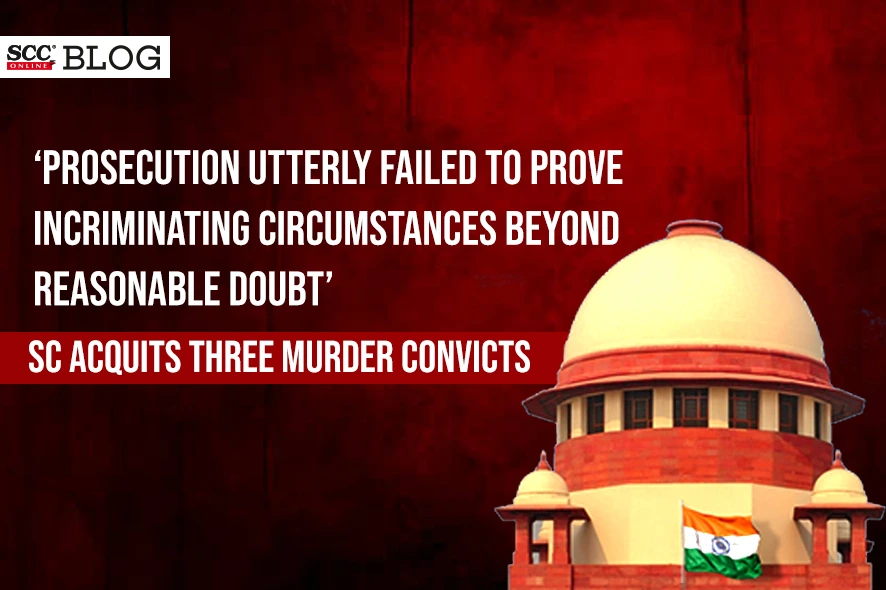Supreme Court: In a criminal appeal against the judgment and order of Delhi High Court, wherein the conviction of the three accused persons by Trial Court for offences under Section 302 read with Section 34 of the Penal Code, 1860 (‘IPC’), the Division Bench of B.R. Gavai and Prashant Kumar Mishra, JJ. allowed the appeal and set aside the High Court’s impugned order and conviction order.
Factual Matrix
In the matter at hand, a First Information Report (‘FIR’) was registered by the brother of the deceased, stating that when he reached his deceased brother’s home, he found him lying dead and that he was taken to hospital where he was declared dead. Suspicion was expressed on deceased person’s son/ accused-1, since he had property dispute with the deceased. During interrogation, the accused-1 revealed the names of his two associates/ accused 2 and 3 and who are the present appellants. During investigation, at the instance of accused-2, one rusted iron rod was recovered and at the instance of accused-3, a sweater was recovered which was used to strangulate the deceased. Chargesheet was filed and subsequently, the Trial Court, vide judgment and order dated 17-05-2013, convicted all the three accused persons under Section 302 read with Section 34 of the IPC and sentenced them to undergo rigorous imprisonment for life and imposed a fine of Rs. 50,000/- each. Appeal was preferred before the High Court against the Trial Court’s order, however, the said appeal was dismissed vide impugned order. Hence, the present appeal was preferred.
Decision
The Court perused the prosecution witnesses’ (‘PW’) statements and noted that during the cross-examination, the PW-1 identified the accused 2 and 3, who were seen coming out of the house of the deceased. However, the Court also noted that the PW-1 had admitted in further cross-examination that he had seen the accused 2 and 3 in the Police State for the first time. The Court also analysed the statement of another prosecution witness on the last seen theory, who deposed on similar lines as that of PW-1. The Court noted that the High Court had observed that the witnesses had identified the accused 2 and 3 and that it was sufficient to hold the guilt of the accused persons. The Court did not agree with the said observations of the High Court and said that if the accused persons were already shown to the witnesses in the Police Station, then the sanctity of Test Identification Parade before the High Court was doubtful.
The Court said that the present case rested on circumstantial evidence. The Court relied on Sharad Birdhichand Sarda v. State of Maharashtra, (1984) 4 SCC 116, wherein the law regarding conviction based upon circumstantial evidence was very well crystalised and it was held “that the circumstances from which the conclusion of guilt is to be drawn should be fully established, the circumstances concerned ‘must or should’ and not ‘may be’ established. It was also held that there is not only a grammatical but a legal distinction between ‘may be proved’ and ‘must be or should be proved’ and the facts so established should be consistent only with the hypothesis of the guilt of the accused, that is to say, they should not be explainable on any other hypothesis except that the accused is guilty. The circumstances should be of a conclusive nature and tendency and they should exclude every possible hypothesis except the one sought to be proved, and that there must be a chain of evidence so complete so as not to leave any reasonable ground for the conclusion consistent with the innocence of the accused and must show that in all human probability the act must have been done by the accused”.
Further, the Court stated that it is a well settled principle of law that however strong a suspicion may be, it cannot take place of proof beyond reasonable doubt. The Court said that the prosecution had utterly failed to prove the incriminating circumstances beyond reasonable doubt as the evidence regarding the last seen theory was totally unreliable and the evidence regarding the Call Detail Records also did not inspire any confidence. Therefore, the Court allowed the present appeals. Thus, the impugned judgment of the High Court and the Trial Court’s conviction order were set aside. The Court acquitted the accused persons of all the charges levelled against them and directed their release if not required in any other case.
[Kamal v. State (NCT of Delhi), 2023 SCC OnLine SC 933, Decided on: 07-08-2023]







